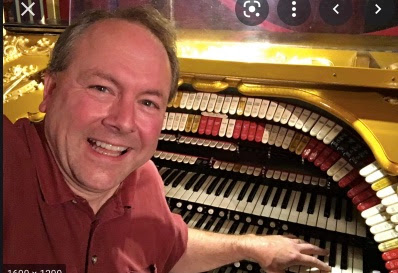Sunday, January 2, 2022
The Phantom Carriage
As I mentioned in yesterday's blog post, we spent yesterday evening with John and Cynthia. It was actually a gift they gave us for Christmas - dinner at an Indian restaurant and a special movie experience at Episilon Spires - a 1921 silent movie, The Phantom Carriage, accompanied by a live sound track - someone playing the classic Estey Pipe Organ which is there - a holdover from the church. Episilon Spires is the name of the venue that was formerly First Baptist Church. The congregation dwindled to the point that it could not maintain the massive building it inhabited on Main Street, so they sold the building to an arts organization, Episilon Spires, and ES has done some extensive remodeling, though the sanctuary still looks very much the same. A very large screen now hangs in front of the organ pipes for the showing of a film. For a concert, I presume the screen is rolled up out of the way. The acoustics in that venue are very good - I have sung there many times both as a member of the Blanche Moyse Chorale and as a soloist. I believe that the First Baptist Church congregation still exists and now uses the Methodist Church as their place of worship. That church building also contains an Estey Pipe Organ, though a smaller one. Our dinner at the Masala Indian Resaurant was very nice. Ellen and I had eaten a late lunch with Max, Tamar and Mais, so we weren't very hungry, but we got Dal Mulligatawny Soup, and shared Naan bread and Vegetable Pakora, which came with chutney and mint sauce. They were delicious and not too much to eat. There were very few patrons and very spread out; both the hostess and the waitress were wearing masks - it felt very safe.
Indian artiacts at the restaurant
Some art work on the wall of the restaurant
This is where we sat for dinner - John is finishing up some paperwork on the bill.************************
After supper we went to Epsilon Spires, and again, very few people and very spread out. The organist, Jeff Rapsis, who goes all over the country doing these silent movie gigs, gave an introductory talk. This was his first time playing the Estey Organ here, and he loved it. He wants to come back. He did a magnificent job accompanying the film - which is an amazing art in itself. It entails improvising music and sound effects on the organ which appropriately express the actions, moods and emotions being depicted on the screen. Not easy to do! But he clearly is very experienced in doing it and is a master at it. The film itself was also very interesting. It is 100 years old exactly, having been released in Sweden on New Years Day, 1921. It had Swedish subtitles, with an English translation. It is highly regarded in the history of film, not only in Sweden, and Europe but world-wide. It is thought to have influenced many directors, including Ingmar Bergmann. Here is a Wiki article on it:
"The Phantom Carriage (Swedish: Körkarlen, literally "The Wagoner") is a 1921 Swedish silent film directed by and starring Victor Sjöström, based on the 1912 novel Thy Soul Shall Bear Witness! (Körkarlen) by Swedish author Selma Lagerlöf. In the film, Sjöström plays a drunkard named David Holm who, on the night of New Year's Eve, is compelled by the ghostly driver of Death's carriage to reflect on his past mistakes. Alongside Sjöström, the film's cast includes Hilda Borgström, Tore Svennberg, and Astrid Holm. The Phantom Carriage was released in Scandinavia on New Year's Day 1921. The following year, Metro Pictures Corporation re-edited and released the film in the United States under the title The Stroke of Midnight; it was known as Thy Soul Shall Bear Witness! in the United Kingdom. The Phantom Carriage is notable for its special effects, its innovative narrative structure with flashbacks within flashbacks, and for having been a major influence on the works of Ingmar Bergman. It has been characterized as belonging to several genres—it has been called a morality tale, a melodrama, a fantasy film, and a horror film. It is sometimes considered one of the first horror films due to its atmosphere and its impact on later entries in the genre. The film is generally considered to be one of the central works in the history of Swedish cinema."
The character, David Holm, took on an unexpected contemporary relevance. One of the ways he shows contempt for society is by coughing on other people - he has consumption, and he says- "Why should I be the only one sick? Why shouldn't everyone be sick? I'm just as good as they are." This attitude ends up giving consumption to the young Salvation Army "sister" who is trying to help him and his family and save him. That fact drives the plot of the movie. The Salvation Army girl, however, has (inexplicably) fallen in love with him and on her death bed, she calls out for him determined to save him. David Holm, in today's terms, is an anti-vaccer and an anti-masker. But ultimately, the SA girl is successful and he repents. I think this film should be shown extensively in red states! It is a very dramatic film, and Jeff's organ-playing added a lot. It was a great experience. Thank you John and Cynthia!
Jeff Rapsis giving his introductory talk. We were sitting in the balcony, so we were looking down at him.
Jeff at the organ console
The set-up for showing the film, with organ console at lower right.
A scene from the film: David Holm, a drunkard, has died, and his "spirit" is seen rising up out of his body while "Death" looks on.
A publicity shot of Jeff, the organist, taken in Sioux City, Iowa.
Subscribe to:
Post Comments (Atom)









No comments:
Post a Comment